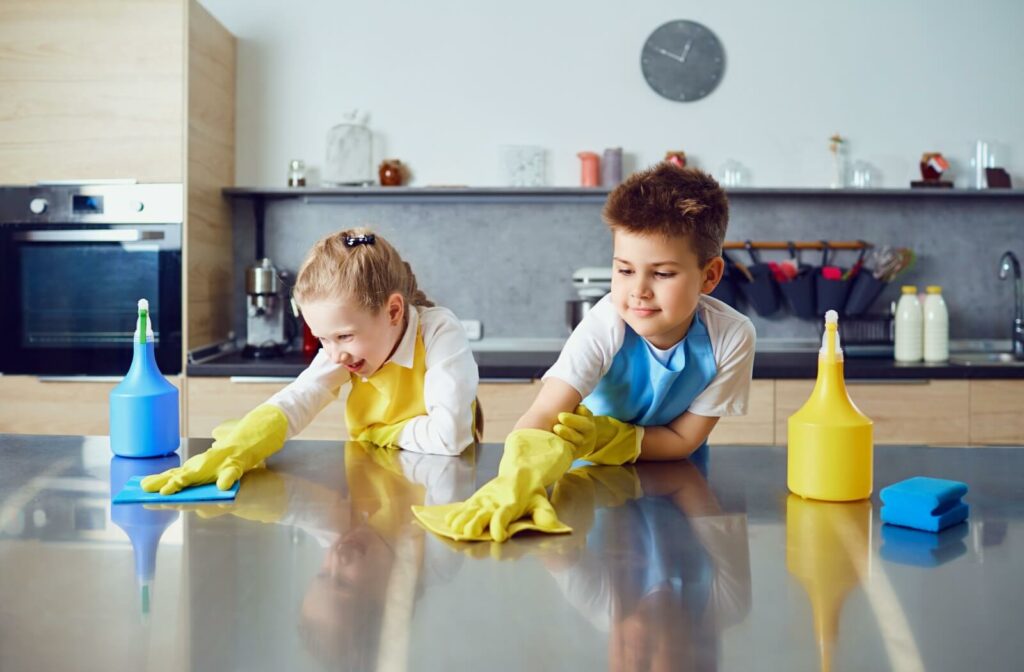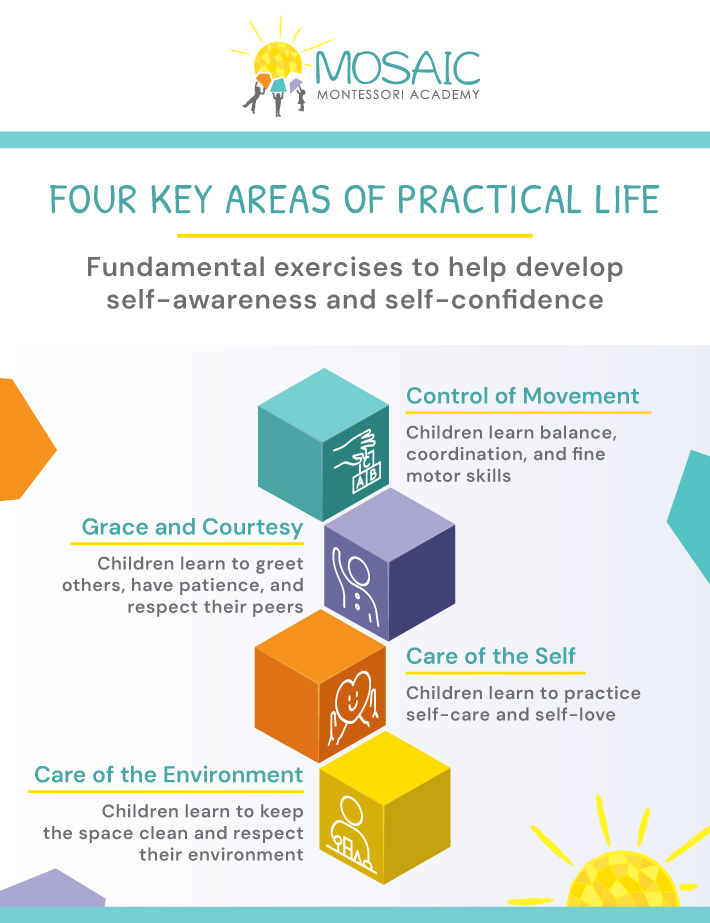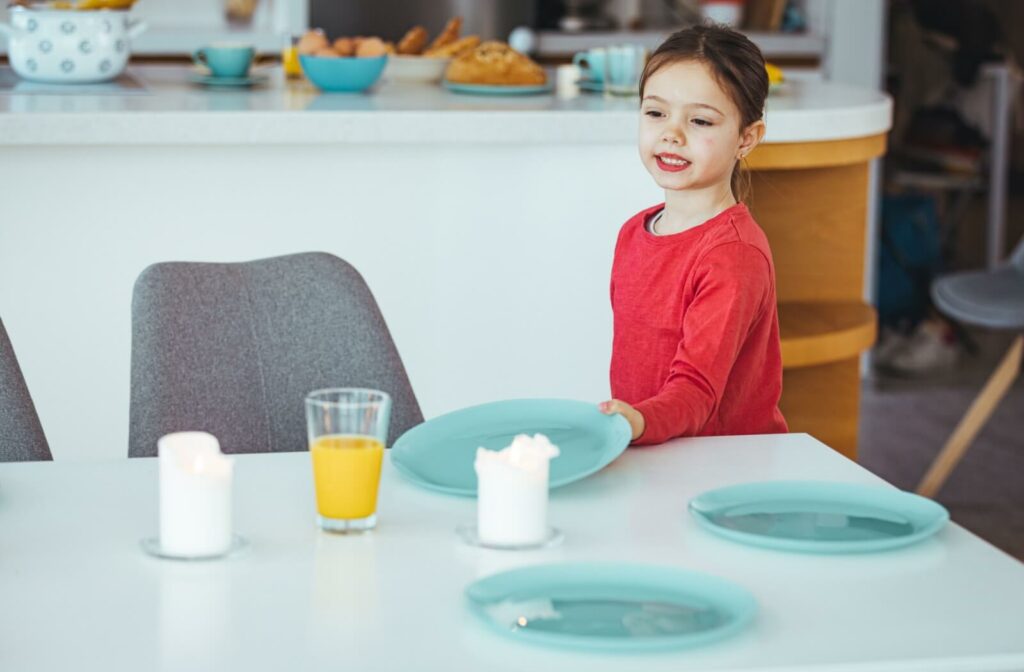For Dr. Maria Montessori, every person moves with intent, so how an adult moves with and around a child impacts how the child sees the environment. Practical life activities then become learning opportunities.
Through constant observation and interaction with the world around them, children gradually learn to place themselves in the practical world. They learn to position themselves as individuals among the people around them.
Montessori practical life promotes children’s sense of self and community through active participation and collaboration.
What Is the Montessori Method?
The Montessori Method focuses less on what the teachers teach and instead focuses on what the learners learn. Montessori teachers guide learning through paths individualized for each child based on their existing skills and current developments.
Montessori’s educational approach places the student at the center of the classroom, encouraging children to seek knowledge and think for themselves, highlighting not memorization but imagination.
What Does “Practical Life” Mean?
Based on Dr. Montessori’s scientific observations, she believed that every person moves with purpose. When an adult performs everyday activities with, around, or to a child, the child begins to learn what to do and why.
“Practical life” means purposeful activity. Everything we do has intent. For instance, we wipe spills to clean up messes. We open containers to access things when we need to, and we close containers to store and preserve their contents.
The Montessori practical life curriculum aims to guide children and develop knowledge and life skills through real, practical experiences.
Purpose in Every Action
Each purposeful action interacts with the self, others, and the environment. For example, we equip the school with tools to foster learning, and we go to school to learn. We may clean up the house to make it more suitable for the family or guests. We may arrange a house to make it a home.

This sense of purpose is the key component in our practical lives. Montessori education aims to guide children to learn specific activities like cleaning, know who performs these activities, and gradually understand why.
Participation & Collaboration
Montessori education develops an environment where children can perform purposeful work. Active participation in practical life activities, as well as practice and repetition, allows children to collaborate with others and become community members.
By participating in practical activities, children purposefully take care of themselves while also caring for others and their environment.
The 4 Areas of Practical Life
The practical life curriculum provides the tools and foundations that help children develop independence. While different Montessori schools may include varying lessons and materials, all practical life activities can generally be divided into 4 key categories.
Control of Movement
Children in a Montessori classroom participate in practical life activities, which can improve fine motor skills, gross motor skills, and hand-eye coordination. These activities can include grasping objects, carrying items, pouring liquids, and even walking in a line.
Montessori curriculums also focus on sensory development, developing visual, tactical, and auditory senses. Practical activities that develop the senses aim to isolate concepts of space and size, helping children to place themselves within a world of real, tangible objects.
Good control of the body and the senses can often improve cognitive skills.
Grace & Courtesy
A Montessori classroom often has mixed-age learning spaces. These diverse classrooms enable collaboration and cooperation between children, regardless of age.
To maintain a good learning environment, children are taught grace and courtesy. They learn to be polite and respectful. Montessori classrooms believe that, though everyone is different, everyone deserves the same level of respect.
Since children are highly observant of how adults around them behave, teachers must be the first to exhibit grace and courtesy in the classroom and encourage children to reciprocate this behaviour.
Care of the Self
Children have plenty of opportunities to learn how to care for themselves, especially at home. Parents can teach their children to wash their hands, dress up, or clip their nails.
However, having the space and time dedicated to learning self-care helps children practice self-care and thus self-love. The self, like other people, should be respected.
Care of the Environment
A classroom is an environment. Every person who uses that classroom, teachers and students alike, plays a part in maintaining the classroom. The Montessori classroom emphasizes the importance of caring for your environment by teaching children to properly respect the communal environment.
Practical life activities that foster care for the environment include cleaning up, wiping tables, watering plants, and feeding pets. Their relationship with the classroom environment can easily affect the way they build their home life.
These 4 categories help children become conscious of their actions and how they impact others. Interactions with themselves, other people, and the environment around them all help children build their own personalities.

How Montessori Education Is Different
While regular education might prepare young children for higher education, Montessori seeks to prepare them for what life has to offer. Where traditional schools may push a one-size-fits-all curriculum, we personalize our curriculums according to each child’s growth.
People learn from each other. Our teachers at Mosaic Montessori Academy learn from children as much as they learn from us. Contact us today to see how we can give your child the tools necessary for them to succeed not only in school but in everyday life.


